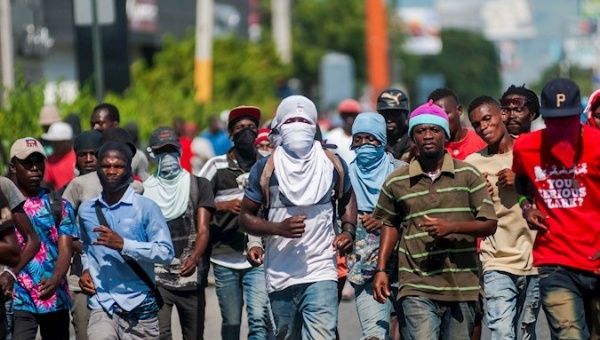
Workers, teachers and students demand the resignation of President Jovenel Moise in Puerto Principe, Haiti, Oct. 28, 2019. | Photo: EFE

Orinoco Tribune – News and opinion pieces about Venezuela and beyond
From Venezuela and made by Venezuelan Chavistas

Workers, teachers and students demand the resignation of President Jovenel Moise in Puerto Principe, Haiti, Oct. 28, 2019. | Photo: EFE
Thousands are protesting against corruption, high inflation, fuel prices, and food shortages. On Sunday, the police also joined the demonstrations.
Haiti’s President Jovenel Moise on Monday admitted that he has requested “humanitarian aid” from the U.S. government as protesters demanding his resignation took to the streets in the seventh week of consecutive demonstration
“We are in a very difficult time,” Moise said in an interview in which the Haitian president did not provide details on the kind of help he requested from President Donald Trump’s administration.
In a speech that seems to have failed to appease protesters, Moise spoke of turning “the crisis into an opportunity” and summoned opposition leaders to dialogue.
“The only way to put the country on the path of stability is through dialogue. This will lead to a political agreement to achieve a government of national unity,” he said and recalled that Haiti has had 15 presidents, 22 prime ministers and 14 years of military occupation since 1986.
RELATED CONTENT: Anti-government Protests in Haiti Turn Violent
Shortly after he spoke, however, thousands marched to protest against corruption, high inflation, fuel prices, and food shortages.
Textile workers, teachers and students took to the streets of Port-au-Prince shouting “Out of Jovenel, the situation is complicated.”
Besides demanding Moise’s departure, Haitians are requesting an increase in their minimum wage, which they described as “miserable”
In #Haiti – Thousands of sweatshop workers (accompanied by their supporters) who earn a measly $4 per day before taxes, skipped work today to take the streets to demand better working standards, higher pay, social benefits, and the resignation of the puppet president. pic.twitter.com/kA1S31lGNS
— Madame Boukman – Justice 4 Haiti 🇭🇹 (@madanboukman) October 28, 2019
The government’s calls for peace have not had any effect, much less after it became known that two protesters died on Sunday.
RELATED CONTENT: Haiti’s Sixth Week of Protests: 30 Protesters Have Died
Currently, the capital’s main streets are full of barricades that prevent normal traffic. Most shops and offices remain closed. Rallies continue to multiply and acquire greater intensity. New social movements are joining the unrest.
“On Sunday the police also decided to take to the streets to denounce their precarious social situation. It was their first march… Due to their fear of reprisals, however, the police marched with their faces masked,” local media RCI reported.
Previously, religious and business leaders have called for the President’s resignation. On Oct. 23, the Popular and Democratic Sector (SDP) leader Andre Michel announced that opposition parties and organizations would begin this week intense demonstrations which will last until Moise resigns.
“There will be a real political battle. What you have seen so far will mean nothing… The whole country will rise. All institutions will be closed. All roads will be cut… We will not give up,” he warned.
Featured image: Workers, teachers and students demand the resignation of President Jovenel Moise in Puerto Principe, Haiti, Oct. 28, 2019. | Photo: EFE